| Listing 1 - 10 of 11 | << page >> |
Sort by
|
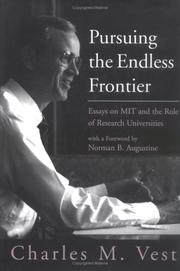
ISBN: 0262285509 9780262285506 1417574720 9781417574728 9780262516785 0262220725 9780262220729 Year: 2004 Publisher: Cambridge MIT press
Abstract | Keywords | Export | Availability | Bookmark
 Loading...
Loading...Choose an application
- Reference Manager
- EndNote
- RefWorks (Direct export to RefWorks)
The former president of MIT discusses challenges and policy issues confronting academia, science and technology, and the world at large.In his fourteen years as president of MIT, Charles Vest worked continuously to realize his vision of rebuilding America's trust in science and technology. In a time when the federal government dramatically reduced its funding of academic research programs and industry shifted its R&D resources into the short-term product-development process, Vest called for new partnerships with business and government. He called for universities to meet the intellectual challenges posed by the innovation-driven, globally connected needs of industry even as he reaffirmed basic academic values and the continuing need for longer-term scientific inquiry.In Pursuing the Endless Frontier, Vest addresses these and other issues in a series of essays written during his tenure as president of MIT. He discusses the research university's need to shift to a broader, more international outlook, the value of diversity in the academic community, the greater leadership role for faculty outside the classroom, and the boundless opportunity of new scientific and technological developments even when coupled with financial constraints. In the provocative essay "What We Don't Know," Vest reminds us of what he calls "the most critical point of all," that science is driven by a deep human need to understand nature, to answer the "big questions"--that what we don't know is more important than what we do. In another essay, on the future of MIT, he celebrates MIT's strengths as being extraordinarily well-suited to the needs of an era of unprecedented change in science and technology. In "Disturbing the Educational Universe: Universities in the Digital Age--Dinosaurs or Prometheans," he describes MIT's innovative OpenCourseWare initiative, which builds on the fundamental nature of the Internet as an enabling and liberating technology.Vest, who is stepping down from MIT's presidency in the fall of 2004, writes with clarity and insight about the issues facing academic institutions in the twenty-first century. His essays in Pursuing the Endless Frontier offer inspiration to educators and researchers seeking the way forward.
Massachusetts Institute of Technology. --- MIT --- M.I.T. --- Instituto Tecnológico de Massachusetts --- Institute of Technology --- Boston Tech --- Massachusetts institute of technology. --- EDUCATION/General
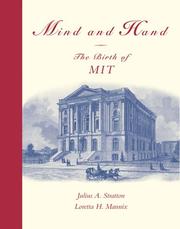
ISBN: 128209825X 9786612098253 0262284480 1423746848 026229396X 9780262284486 9781423746843 9780262293969 0262195240 9780262195249 9781282098251 6612098252 Year: 2005 Publisher: Cambridge MIT
Abstract | Keywords | Export | Availability | Bookmark
 Loading...
Loading...Choose an application
- Reference Manager
- EndNote
- RefWorks (Direct export to RefWorks)
The intellectual heritage of MIT: an account of "the flow of ideas" about science and education that shaped the Institute as it emerged and that inspires it today. The motto on the seal of the Massachusetts Institute of Technology, "Mens et Manus"--"mind and hand"--signals the Institute's dedication to what MIT founder William Barton Rogers called "the most earnest cooperation of intelligent culture with industrial pursuits." Mind and Hand traces the ideas about science and education that have shaped MIT and defined its mission--from the new science of the Enlightenment era and the ideals of representative democracy spurred by the Industrial Revolution to new theories on the nature and role of higher education in nineteenth-century America. MIT emerged in mid-century as an experiment in scientific and technical education, with its origins in the tension between these old and new ideas. Mind and Hand was undertaken by Julius Stratton after his retirement from the presidency of MIT and continued by Loretta Mannix after his death; Philip N. Alexander, of the MIT Program in Writing and Humanistic Studies, stepped in to complete the project. The combined efforts of these three authors have given us what Julius Stratton envisioned--"a coherent account of the flow of ideas" from which MIT emerged.
Technology - General --- Engineering & Applied Sciences --- Massachusetts Institute of Technology --- History. --- MIT --- EDUCATION/General --- M.I.T. --- Instituto Tecnológico de Massachusetts --- Institute of Technology --- Boston Tech --- 378.4 <73 CAMBRIDGE> --- 378.4 <73 CAMBRIDGE> Universiteiten--Verenigde Staten van Amerika. VSA. USA--CAMBRIDGE --- Universiteiten--Verenigde Staten van Amerika. VSA. USA--CAMBRIDGE --- Massachusetts institute of technology --- Higher education
Book
ISBN: 1421400294 0801890330 Year: 2009 Publisher: Baltimore : Johns Hopkins University Press,
Abstract | Keywords | Export | Availability | Bookmark
 Loading...
Loading...Choose an application
- Reference Manager
- EndNote
- RefWorks (Direct export to RefWorks)
College presidents --- Science --- Engineering --- Study and teaching (Higher) --- History. --- Study and teaching --- Rogers, William Barton, --- Massachusetts Institute of Technology --- Presidents --- Construction --- Industrial arts --- Technology --- Natural science --- Science of science --- Sciences --- Presidents, College --- University presidents --- College administrators --- Universities and colleges --- Administration --- Rogers, Wm. B. --- MIT --- M.I.T. --- Instituto Tecnológico de Massachusetts --- Institute of Technology --- Boston Tech --- Natural sciences
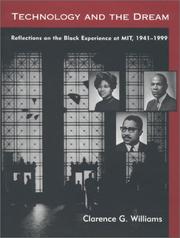
ISBN: 0262286300 1423725506 9780262286305 9781423725503 026223212X 0262731576 9780262232128 Year: 2003 Publisher: Cambridge, Massachusetts
Abstract | Keywords | Export | Availability | Bookmark
 Loading...
Loading...Choose an application
- Reference Manager
- EndNote
- RefWorks (Direct export to RefWorks)
Transcripts of more than seventy-five oral history interviews in which the interviewees assess their MIT experience and reflect on the role of blacks at MIT and beyond. This book grew out of the Blacks at MIT History Project, whose mission is to document the black presence at MIT. The main body of the text consists of transcripts of more than seventy-five oral history interviews, in which the interviewees assess their MIT experience and reflect on the role of blacks at MIT and beyond. Although most of the interviewees are present or former students, black faculty, administrators, and staff are also represented, as are nonblack faculty and administrators who have had an impact on blacks at MIT. The interviewees were selected with an eye to presenting the broadest range of issues and personalities, as well as a representative cross section by time period and category.Each interviewee was asked to discuss family background; education; role models and mentors; experiences of racism and race-related issues; choice of field and career; goals; adjustment to the MIT environment; best and worst MIT experiences; experience with MIT support services; relationships with MIT students, faculty, and staff; advice to present or potential MIT students; and advice to the MIT administration. A recurrent theme is that MIT's rigorous teaching instills the confidence to deal with just about any hurdle in professional life, and that an MIT degree opens many doors and supplies instant credibility.Each interview includes biographical notes and pictures. The book also includes a general introduction, a glossary, and appendixes describing the project's methodology.
Technology - General --- Engineering & Applied Sciences --- African American college students --- Massachusetts Institute of Technology --- History. --- Afro-American college students --- College students, African American --- College students, Negro --- College students --- M.I.T. --- MIT --- Instituto Tecnológico de Massachusetts --- Institute of Technology --- Boston Tech --- History --- HUMANITIES/History
Book
ISBN: 0262294389 1283119048 9786613119049 0262295407 9780262295406 9781283119047 9780262015639 0262015633 6613119040 9780262294386 0262543990 Year: 2011 Publisher: Cambridge, Mass. MIT Press
Abstract | Keywords | Export | Availability | Bookmark
 Loading...
Loading...Choose an application
- Reference Manager
- EndNote
- RefWorks (Direct export to RefWorks)
How MIT's first nine presidents helped transform the Institute from a small technical school into a major research university.
Massachusetts Institute of Technology --- M.I.T. --- MIT --- Instituto Tecnológico de Massachusetts --- Institute of Technology --- Boston Tech --- Cambridge (Mass.) --- Intellectual life. --- Universities --- History of engineering & technology --- History of education --- Higher and further education, tertiary education --- History of engineering and technology --- EDUCATION / Higher --- TECHNOLOGY & ENGINEERING / History --- EDUCATION / History
Book
ISBN: 0674495462 0674088980 9780674088986 9780674504714 0674504712 Year: 2016 Publisher: Cambridge, MA
Abstract | Keywords | Export | Availability | Bookmark
 Loading...
Loading...Choose an application
- Reference Manager
- EndNote
- RefWorks (Direct export to RefWorks)
In the late 1800s India seemed to be left behind by the Industrial Revolution. Today there are many technological Indians around the world but relatively few focus on India’s problems. Ross Bassett—drawing on a database of every Indian to graduate from the Massachusetts Institute of Technology through 2000—explains the role of MIT in this outcome.
Technology transfer --- Technological transfer --- Transfer of technology --- Diffusion of innovations --- Inventions --- Research, Industrial --- Technology and international relations --- Foreign licensing agreements --- Technological forecasting --- Technological innovations --- Technology --- History. --- International cooperation --- Massachusetts Institute of Technology --- M.I.T. --- MIT --- Instituto Tecnológico de Massachusetts --- Institute of Technology --- Boston Tech --- Foreign students. --- India
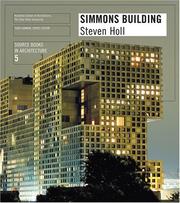
ISBN: 1568984642 Year: 2004 Publisher: New York Monacelli
Abstract | Keywords | Export | Availability | Bookmark
 Loading...
Loading...Choose an application
- Reference Manager
- EndNote
- RefWorks (Direct export to RefWorks)
Simmons Hall --- MIT --- Massachusetts Institute of Technology --- Holl, Steven --- Massachusetts --- Cambridge --- Cambridge (MA) --- 72 --- UN Studio (Ben van Berkel, Caroline Bos) --- Architectuur ; 1996 ; UN Studio ; Rotterdam Erasmusbrug --- UN Studio (Van Berkel & Bos) --- Bruggen ; 20ste eeuw --- 72.07 --- Architectuur --- Architecten. Stedenbouwkundigen A - Z --- Architects --- Massachusetts institute of technology --- Simmons Hall (Cambridge, Mass.) --- Buildings --- Design and construction. --- M.I.T. --- Instituto Tecnológico de Massachusetts --- Institute of Technology --- Boston Tech
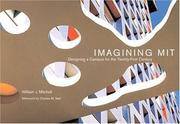
ISBN: 0262134799 9780262134798 Year: 2007 Publisher: Cambridge, Mass. The MIT Press
Abstract | Keywords | Export | Availability | Bookmark
 Loading...
Loading...Choose an application
- Reference Manager
- EndNote
- RefWorks (Direct export to RefWorks)
Campus planning --- Massachusetts Institute of Technology --- Buildings. --- Planning. --- 727.3 --- Architectuur ; scholenbouw ; 20ste en 21ste eeuw --- Architectuur ; onderwijs ; Verenigde Staten --- Onderwijsgebouwen ; MIT ; Massachusetts Institute of Technology --- Roche, Kevin --- Holl, Steven --- Gehry, Frank O. --- Correa, Charles --- Maki, Fumihiko --- Aalto, Alvar --- Saarinen, Eero --- Gebouwen voor opleiding en wetenschap ; universiteiten, hogescholen --- Gehry, Frank O --- College campuses --- Educational planning --- Universities and colleges --- Planning --- MIT --- Massachusetts institute of technology --- M.I.T. --- Instituto Tecnológico de Massachusetts --- Institute of Technology --- Boston Tech
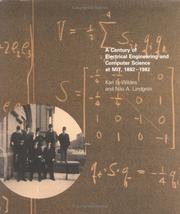
ISBN: 0262231190 9780262291033 9780262231190 0262291037 Year: 1986 Publisher: Cambridge, Mass. MIT Press
Abstract | Keywords | Export | Availability | Bookmark
 Loading...
Loading...Choose an application
- Reference Manager
- EndNote
- RefWorks (Direct export to RefWorks)
Electrical engineering is a protean profession. Today the field embraces many disciplines that seem far removed from its roots in the telegraph, telephone, electric lamps, motors, and generators. To a remarkable extent, this chronicle of change and growth at a single institution is a capsule history of the discipline and profession of electrical engineering as it developed worldwide. Even when MIT was not leading the way, the department was usually quick to adapt to changing needs, goals, curricula, and research programs. What has remained constant throughout is the dynamic interaction of teaching and research, flexibility of administration, the interconnections with industrial progress and national priorities.The book's text and many photographs introduce readers to the renowned teachers and researchers who are still well known in engineering circles, among them: Vannevar Bush, Harold Hazen, Edward Bowles, Gordon Brown, Harold Edgerton, Ernst Guillemin, Arthur von Hippel, and Jay Forrester.The book covers the department's major areas of activity - electrical power systems, servomechanisms, circuit theory, communications theory, radar and microwaves (developed first at the famed Radiation Laboratory during World War II), insulation and dielectrics, electronics, acoustics, and computation. This rich history of accomplishments shows moreover that years before "Computer Science" was added to the department's name such pioneering results in computation and control as Vannevar Bush's Differential Analyzer, early cybernetic devices and numerically controlled servomechanisms, the Whirlwind computer, and the evolution of time-sharing computation had already been achieved.Karl Wildes has been associated with the Department of Electrical Engineering and Computer Science since the 1920s, and is now Professor Emeritus. Nilo Lindgren, an electrical engineering graduate of MIT and professional scientific and technical journalist for many years, is at present affiliated with the Electric Power Resärch Institute in Palo Alto, California.
Computer. Automation --- Electrical engineering --- Higher education --- Massachusetts Institute of Technology --- anno 1800-1999 --- Computer science --- Computer engineering --- History. --- Informatics --- Science --- Computers --- Design and construction --- M.I.T. --- MIT --- Instituto Tecnológico de Massachusetts --- Institute of Technology --- Boston Tech --- Massachusetts --- Cambridge --- Universities: Massachusetts Institute of Technology. Department of Electrical Engineering and Computer Science, to 1982. --- Universities --- Department of Electrical Engineering and Computer Science, to 1982 --- ENGINEERING/Electrical Engineering
Book
ISBN: 128325882X 9786613258823 0262300060 0262294850 9780262300063 9781283258821 0262015943 9780262015943 Year: 2011 Publisher: Cambridge, Mass. MIT Press
Abstract | Keywords | Export | Availability | Bookmark
 Loading...
Loading...Choose an application
- Reference Manager
- EndNote
- RefWorks (Direct export to RefWorks)
A memoir of MIT life, from being Noam Chomsky's boss to negotiating with student protesters.
College department heads --- Linguistics --- College administrators --- Study and teaching (Higher) --- Keyser, Samuel Jay, --- Massachusetts Institute of Technology --- Massachusetts Institute of Technology. --- Faculty --- Cambridge (Mass.) --- Intellectual life. --- College officials --- University administrators --- University officials --- Linguistic science --- Science of language --- Academic department heads (Universities and colleges) --- Department heads, College --- Departmental chairmen (Universities) --- University department heads --- Keyser, S. Jay --- Keyser, Jay, --- MIT --- Universities and colleges --- Language and languages --- Administration --- Administrators, College --- Administrators, University --- Officials, College --- Officials, University --- School administrators --- MIT Linguistics --- M.I.T. --- Instituto Tecnológico de Massachusetts --- Institute of Technology --- Boston Tech
| Listing 1 - 10 of 11 | << page >> |
Sort by
|

 Search
Search Feedback
Feedback About UniCat
About UniCat  Help
Help News
News